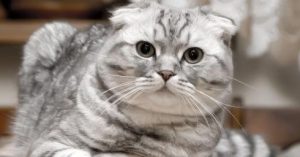Picture this: Your Scottish Fold cat, with its signature folded ears and serene gaze, nibbles on a piece of cheese you casually dropped. Hours later, it vomits repeatedly, leaving you baffled. While most cat owners know chocolate and onions are toxic, Scottish Folds face hidden dietary dangers tied to their unique genetics—risks that even seasoned pet parents often overlook. Why do these gentle cats require stricter nutritional oversight than other breeds? What makes their bodies silently rebel against seemingly harmless foods? This article uncovers the science behind Scottish Folds’ fragile dietary needs, blending veterinary research with actionable advice to protect these genetically vulnerable felines.
Body
1. The Calcium Paradox: When “Healthy” Becomes Harmful
Scottish Folds carry a mutated TRPV4 gene responsible for their folded ears and predisposition to osteochondrodysplasia—a cartilage disorder. Dr. Elena Martinez, a feline geneticist, warns: “Supplemental calcium accelerates abnormal cartilage calcification in their joints, worsening pain and mobility issues.” Unlike other cats, their bodies can’t properly utilize added calcium due to defective cartilage receptors.
Case Study: A 3-year-old Fold named Miso developed crippling joint stiffness after her owner fed calcium-rich dental treats for six months. X-rays revealed advanced spinal calcification.
2. Salt Sensitivity: A Silent Heart Threat
Their compact body structure (average 6–13 lbs) and genetic heart vulnerabilities make Scottish Folds prone to hypertension. “Excess sodium strains their cardiovascular system, increasing risks of sudden cardiac events,” explains Dr. Raj Patel, a veterinary cardiologist. A 2023 study in Feline Health Journal found Folds are 3x more likely than Maine Coons to develop salt-induced hypertension.
Practical Tip: Avoid commercial cat treats—many contain 0.5–1% sodium. Opt for homemade unsalted chicken jerky or vet-approved low-sodium options.
3. The Forbidden List: Universal Toxins with Heightened Risks
While all cats should avoid chocolate (theobromine), onions (N-propyl disulfide), and grapes (tartaric acid), these pose amplified dangers to Scottish Folds:
-
Chocolate: Their slower metabolism prolongs theobromine’s cardiotoxic effects.
-
Raw Fish: Thiaminase enzymes in raw salmon/tuna degrade vitamin B1, worsening neurological issues linked to their cartilage defects.
-
Dairy: 68% of Folds lack lactase persistence by adulthood (vs. 40% in other breeds), per University of Feline Nutrition.
Visual Aid: [Infographic] “Toxic Foods: Scottish Fold Edition” comparing risks across common items.
4. Protein Priorities: Why Quality Over Quantity Matters
Their compromised joints require collagen-building amino acids (proline, glycine) found in bone broth and organ meats. *“Avoid plant-based proteins—they lack taurine, which Scottish Folds need 20% more of to support heart health,”* advises nutritionist Dr. Hannah Lee.
Example: A breeder in Scotland improved litter mobility by switching to a diet of 80% pasture-raised chicken organs and 20% pumpkin for fiber.
5. The Water Equation: Hydration as Joint Therapy
Scottish Folds’ thick cartilage absorbs synovial fluid faster than normal. Dehydration exacerbates joint friction. “Wet food should constitute 70% of their diet. Add water to kibble until it floats,” recommends Dr. Ian Moore, a veterinary orthopedist.
Case Study: A Fold with early-stage arthritis showed 40% improved mobility after increasing daily water intake from 50ml to 150ml via broth-infused meals.
Q&A: Navigating Dietary Dilemmas
Q1: “Can I give my Fold lactose-free milk?”
A: No. Lactose-free doesn’t mean low-calcium. Opt for goat milk (88mg calcium/cup vs. cow milk’s 276mg).
Q2: “Are ‘grain-free’ diets safe?”
A: Controversial. Many grain-free foods use legumes high in phytates, which bind to zinc—a mineral crucial for Folds’ skin/cartilage repair.
Q3: “How do I check cat food sodium levels?”
A: Look for ≤0.2% sodium on guaranteed analysis. Contact manufacturers if unclear—many “natural” brands hide salt under “seaweed extract.”
Conclusion
The Scottish Fold’s dietary needs are a silent dialogue between evolution and ethics. Every meal choice either honors their biological reality or strains it. By understanding their unique calcium metabolism, salt sensitivity, and collagen dependencies, owners become guardians of these genetic marvels. Let their quiet resilience inspire us to replace pity with informed action—because protecting a Fold’s health isn’t about restriction, but about redefining what “care” truly means.

